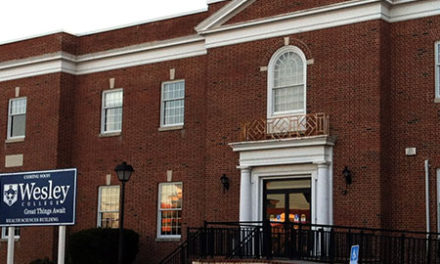by Joncara Marshall (Whetstone Staff Writer)
Jewel Coles, a sophomore psychology major, plans to become a marriage counselor after she graduates.
She loves taking her psychology courses, but can’t understand why she has to bother taking “core courses,†including religion.
“Religion has nothing to do with being a psychologist,†Coles said.
The College hopes to be able to enlighten her as to why she needs a lot more than just psychology to become a better psychologist and educated person by completely revising its core curriculum, which includes the religion requirement.
Wesley’s faculty has been working to make revisions to a core curriculum that has not been changed in 20 years. It’s set to begin in fall 2013.  The new core curriculum only affects new students; students go by the year of the catalog in which they started at Wesley.
“It has been a very good process,†said Dr. Patricia Dwyer, vice president of academic affairs. “The faculty has been very involved in the discussions along away.
The goals of new core include improving students’ skills in communication and critical thinking, as well as giving them different perspectives.
So, instead of using the core as a “schedule-filler†and seemingly without an overarching reason – such as picking a history class here, a math class there and not making connections – the new core is supposed to integrate the disciplines under themes.
A first year seminar will include instruction in writing and integrate different disciplines. One example might be showing the historical and literary context of the civil rights movement – not just its political context.
For the past 18 months, the faculty has been reviewing different ideas through discussions, presentations, information sessions and workshops.  Ideas have been processed through the faculty, Academic Affairs committee, and the General Education Institution team, which includes Dr. Dwyer and Dr. Jeffrey Gibson, associate professor of English.
Gibson said the changes will be an opportunity to freshen up the curriculum.
“It’s time for the curriculum to reflect the faculty and students of Wesley College in the 21st century,†Dr. Gibson said.
Both Gibson and Dwyer said that the core revision should not affect Wesley’s Middle State accreditation.
No formal decisions have been made, but some of the ideas may be approved by fall.
“I think the new curriculum will change how the classes are constructed and how the professors will teach the courses,†Dwyer said.
According to Wesley’s academic catalogue, the purpose of the core is to provide “each student with an exposure to intellectual and global concepts that can serve as a basis for developing an informed individual in society.â€
Courses often fall into these five categories: the human experience, global society and its culture, analysis, scientific literacy, and communicating in the world.
Students must take a variety of 45-48 credit courses in subjects that may not have anything to do with their major. The goal of the core curriculum at every liberal arts college is to expand the student’s learning.




